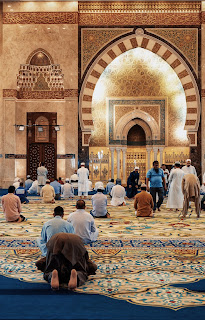Ramadan starts on the evening of April 23 and culminates on May 23. Over the 30 days, Muslims fast during the daylight, a practice that's seen together of the five pillars of Islam. they will eat before sunrise, and break their fast after dusk every day. Muslims believe their Holy Book, the Quran, was revealed to the Prophet Mohammed during this holy month. Besides abstinence from food and water, Muslims are asked to abstain from sexual activity also.
During the month, Muslims also attempt to practice "zakat," or charity, another one among the five pillars of Islam.
According to a 2017 survey published by the Pew research facility, 80% of yank Muslims observe the holy month by fasting. The Arabic etymology of Ramadan references extreme heat. Fasting, therefore, becomes the spiritual process of burning away sin with good deeds.
During Ramadan, two main meals are served to start and end the daytime fast. "Suhoor" is served and eaten before dawn, and "iftar," is served and eaten after sunset. Typically, these meals are enjoyed in group gatherings among family and friends.
Islamic holy sites, including Mecca and Medina in Saudi Arabia and Al-Aqsa mosque in Jerusalem, are going to be empty during Ramadan after authorities advised worshipers to wish reception. The Al-Aqsa Mosque compound in Jerusalem -- Islam's third holiest place -- also will remain closed during Ramadan, the Jerusalem Islamic Waqf Council said Thursday.
For Muslims, an enormous part of the holy month consists of special night prayers called "Taraweeh," which are held daily at the mosque and performed by the imam, the mosque's prayer leader. Historically speaking, mosques are full of worshipers during the month of Ramadan, said Imam Omar Suleiman, the founder, and president of the Yaqeen Institute for Islamic Research. But, Suleiman said the night prayer is often performed at the mosque or reception, there is no difference within the validity between the 2.
During this point, when people are self quarantining reception to avoid spreading the coronavirus, Suleiman said he wants to encourage Muslims to specialize in individual prayer habits and switch isolation into inner peace.
"When you tell people, it's good for you to find out individual prayer habits immediately, people have a tough time making the connection because they're so won't to praying at the mosque," Suleiman, who is an adjunct professor of Islamic studies at Southern Methodist University, told CNN.
Still, Suleiman said he does worry that the shift to temporary virtual worship could lead to an eventual lack of interest for in-person prayer. He said he's concerned that when Muslims are ready to ditch their screens and return to mosques, they will not want to.
"There's something about embrace and praying together and being together and upholding traditional ritualistic sorts of worship," he said. "And I do not want to lose that because we're feeling down about being quarantined this Ramadan. I do not want us to try to something that's getting to harm the trajectory afterwards."
Eid al-Fitr, the Judgment Day of Ramadan, is taken into account one among the foremost important days for Muslims. the vacation is understood because of the "festival of breaking the fast."
During the day, Muslims take in large open spaces or mosques for special prayers, called Salat al-Eid, which are usually followed by a little breakfast -- their first daytime meal during a month.
Gifts are typically exchanged and almsgiving is additionally a standard practice. Another custom involves donning new clothes for the day, which marks a spiritual renewal. Food is a crucial part of Eid al-Fitr, as feasting takes the place of fasting with community members, family, and friends.
Hind Makki, a Chicago-based interfaith educator at the Institute for policy and Understanding, told CNN she sees this Ramadan as an honest time for self-reflection, despite Ramadan being a solely communal experience.
"We also can return to the thought that Ramadan may be a spiritual retreat," she said. "And since we're beat our homes, most folks, we do not always need to be online," she said.
Presidential Message on Ramadan, 2020
I wish all Muslims, both within us and across the planet, a blessed and peaceful Ramadan.
For millions around the globe, this holy month is a chance to renew and strengthen their faith through rigorous fasting, devout prayer, reflective meditation, reading the Quran, and charitable deeds. These acts are closely aligned with the universal values that the Islamic faith promotes—peace, kindness, and love, and respect for others.
Over the past months, we've seen how important the facility of prayer is often during challenging times. Today, because the holy month of Ramadan commences, I pray that those that are observing this sacred time find comfort and reassurance in their faith.
Ramadan Mubarak.
